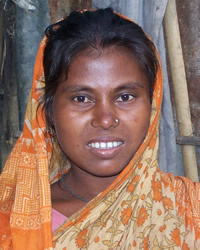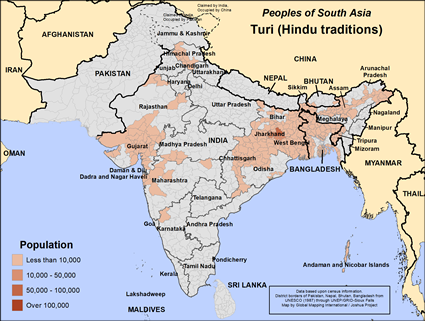Turi (Hindu traditions) in Pakistan

Photo Source:
Gerald Roberts
|

Map Source:
People Group data: Omid. Map geography: UNESCO / GMI. Map Design: Joshua Project.
|
| People Name: | Turi (Hindu traditions) |
| Country: | Pakistan |
| 10/40 Window: | Yes |
| Population: | 2,100 |
| World Population: | 380,100 |
| Primary Language: | Sindhi |
| Primary Religion: | Hinduism |
| Christian Adherents: | 2.48 % |
| Evangelicals: | 2.48 % |
| Scripture: | Complete Bible |
| Ministry Resources: | Yes |
| Jesus Film: | Yes |
| Audio Recordings: | Yes |
| People Cluster: | South Asia Dalit - other |
| Affinity Bloc: | South Asian Peoples |
| Progress Level: |
|
Introduction / History
The Hindu Turi people have challenging lives. They are viewed as outcasts by the Hindu community. The Turi are a scheduled caste in India, meaning they have low status in Hindu communities. There is no official caste system in Pakistan but the small number of Hindu Turi there are seen as one of the lowest groups in the nation.
The primary language of the Indian Turi people is Hindi. Other Indian Turi speak Bengali and other regional Indian languages. Sindhi is the first language of the Pakistani Turi. Many resources are available in Sindhi including a complete Bible and the JESUS Film.
What Are Their Lives Like?
The traditional occupation of the Hindu Turi was that of making useful things from bamboo. These bamboo items include many types of baskets, mats, hats, and furniture. The bamboo items are now made by factories more efficiently. The demand for their handmade products has declined. As a result, more Turi are now working as landless agricultural laborers. They are frequently abused by the land owners who make them work for low wages in poor living conditions.
Illiteracy is an issue among the Turi especially for women. Over one third of them are unable to read or write. Children often quit school early to help their families make a living. Many Turi lack access to modern medicine, clean water, electricity, and indoor plumbing. Due to these conditions their life expectancy is low and child mortality is high.
What Are Their Beliefs?
Almost all Turi practice Hinduism, the ancient religion of India. They worship and serve the gods of the Hindu pantheon. Their principal deity is Singbonga or the sun, the great god of the Mundas. The Mundas are the larger group of people from which the Turi originated.
Hindus believe that by performing rituals and good works that they will attain moksha or freedom from the endless cycle of birth, death and rebirth. The Turi are often denied entrance into Hindu temples due to their low class designation. The Turi offer prayers, food, flowers, and incense to their gods at their own shrines. They employ their own priests, as Brahmins will not serve at their important life events.
The main yearly holidays of the Turi people are Holi, the festival of colors, Diwali, the festival of lights and Navratri, the celebration of autumn.
There are a tiny number of Christian and Buddhist Turi.
What Are Their Needs?
The Turi people have pressing needs. They need help in educating their children. They need help in acquiring electricity, access to clean water and indoor plumbing. They need help in gaining new job skills. Most of all the Turi needs to hear and believe in the life-changing message of Jesus Christ. He alone can forgive their sins and give them a hope for the future.
Prayer Points
Pray that God sends the Turi to the loving arms of God the Father and His Son Jesus Christ.
Pray for Turi families and communities to discover and embrace the free gift of life found by trusting Christ.
Pray for the Holy Spirit to work powerfully through those Christians ministering to the Turi people.
Pray that the Pakistani Turi parents might be able to provide adequately for their children.